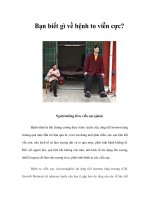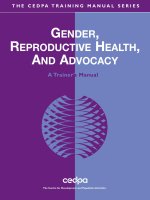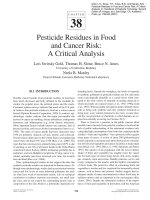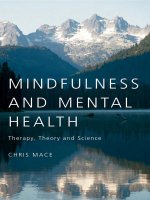Food and Mental Stimulation to Prevent Dementia docx
Bạn đang xem bản rút gọn của tài liệu. Xem và tải ngay bản đầy đủ của tài liệu tại đây (850.21 KB, 35 trang )
Food and Mental Stimulation to
Food and Mental Stimulation to
Prevent Dem entia
Prevent Dem entia
Gerontological
Gerontological
Research
Research
Programme
Programme
,
,
National University of Singapore
National University of Singapore
Department of Psychological Medicine
Department of Psychological Medicine
Ng Tze Pin
Ng Tze Pin
Public Seminar: Good News of Ageing, 1 March 2008
Food and Mental Stimulation to
Food and Mental Stimulation to
Prevent Dementia
Prevent Dementia
Gerontological
Gerontological
Research
Research
Programme
Programme
,
,
National University of Singapore
National University of Singapore
Department of Psychological Medicine
Department of Psychological Medicine
Ng Tze Pin
Ng Tze Pin
Public Seminar: Good News of Ageing, 1 March 2008
Stay mentally healthy in old age
Stay mentally healthy in old age
“Do not go gentle into that good night”
The Last Battle
of the Mind
Dementia
“Do not go gentle into that good night”
The Last Battle
of the Mind
Dementia
“Do not go gentle into that good night”
The Last Battle
of the Mind
Dementia
Dementia
Dementia
National Institute of Neurological Disorders and Stroke
A brain problem that makes it hard for a person to
remember, learn and communicate
Unable able to think well enough to do normal
activities, such as getting dressed or eating.
Lose their ability to solve problems or control their
emotions.
Personalities may change.
Become agitated or see things that are not there.
Memory loss is common but by itself does not
mean dementia
Dementia
Dementia
National Institute of Neurological Disorders and Stroke
A group of symptoms due by damage
and poor functioning of brain cells
Caused by head injury, stroke,
Alzheimer's disease, drugs, alcohol,
nutritional deficiencies, etc
Available drugs cannot cure dementia
but may improve symptoms or slow
down the disease
Prevalence of Cognitive Impairment
Among Elderly Aged 60+ in Singapore
6%
18%
76%
Severe
Mild to Moderate
No
Cognitive impairment is defined by MMSE score <24;
Mild to moderate: 19 to 23; Severe:18 or less
Prevalence of Dementia in Singapore
National Mental Health Survey of the Elderly, 2003
% (95% C.I.)
≥ 60 years 5.2 ( 3.6 – 6.7 )
≥ 65 years 6.0 ( 4.0 – 8.0 )
≥ 75 years 13.9 ( 7.9 – 19.9)
Fight dementia
Fight dementia
Maintain good cognitive function
Maintain good cognitive function
Maintain good cognitive function
The brain is ‘plastic’
Brain cells are able to grow and
regenerate even in old age
Build up functional ‘cognitive reserve’
Preserving good
cognitive
function is the
best defense
against dementia
0
5
10
15
20
25
30
35
60 70 80 90
Normal
Demented
Cognitive decline
Age
Factors Influencing Cognitive Functioning
Factors Influencing Cognitive Functioning
Age, Gender, Ethnicity
Education
Vascular factors: high blood pressure,
diabetes, heart disease, stroke
Nutrition: Anti-Oxidants and Micronutrients
Physical, social and productive activities
Mean Cognitive Function (MMSE) Scores
Mean Cognitive Function (MMSE) Scores
15.0
20.0
25.0
30.0
None Primary Secondary +
MMSE score
Chinese Malays Indians
# Adjusted for demographic, social, biological and health variables
Education makes a difference
Education makes a difference
Don’t stop your education
Develop the habit of life long learning
Social activities
Attending church/temple/mosque
Joining group activities (karaoke)
Joining senior citizen club activities
Playing cards/games/bingos/mahjong
Visiting cinemas/restaurants/sports events
Day/excursion trips
Productive activities
Preparing meals
Shopping
Hobbies (reading, music, painting, gardening, etc)
Unpaid community work
Paid community work
Other paid leisure employment/business
Physical/fitness activities
Walking/ jogging
Physical calisthenics routines
Active sports or swimming
Taiji
Stay physically, mentally and socially active
Stay physically, mentally and socially active
Infrequent Leisure Activities: never or less than once a month
≥55+yr ≥65yr ≥75yr
Infrequent Exercise 28.7% 30.2% 35.4%
Infrequent social activities 13.3% 17.3% 25.3%
Infrequent productive activities 6.8% 10.2% 19.1%
Senior Lotus Eaters?
Senior Lotus Eaters?
Data from Singapore Longitudinal Aging Studies: older adults aged 55+
Leisure activities – Tertiles
Low Medium High
Whole
sample
Sample size, No. 1635 524 601 510
Median number of activities 6.0 3.0 6.0 9.0
Frequency at least once a week, % 64.2 48.4 67.2 77.1
Data from Singapore Longitudinal Aging Studies: older adults aged 55+
Data from the Singapore Longitudinal Aging Studies: Niti M, et al; International Psychogeriatrics, 2008
0.6
0.62
1
0
0.2
0.4
0.6
0.8
1
1.2
Relative Risk of Cognitive Decline
Low Moderate High
Level of Leisure Time Activities
‘
‘
Use it or lose it
Use it or lose it
’
’
Activity Type
No.
participants
Relative Risks of
Cognitive Decline
A
t least one
p
h
y
sical activit
y
No 391 1.00
Yes 1240 0.78
At least one social activity
No 208 1.00
Yes 1427 0.85
At least one productive activity
No 81 1.00
Yes 1553 0.36
Comparison
Comparison
Nutritional deficiencies in elderly
Nutritional deficiencies in elderly
Nutritional deficiencies are common in the elderly
More than a third of elderly in the community are at risk of
malnutrition
Factors:
chronic diseases
multiple drugs use
reduced mobility
age-related physiological and social changes.
Marginal or biochemical (‘subclinical’) deficiencies have significant
health effects
Nutritional Health of Singaporean Seniors
Nutritional Health of Singaporean Seniors
DETERMINE Your Nutritional Health Checklist
At Risk of Poor Nutrition N=2611
Having illness that change the kind and/or amount of food consumed 40.3%
Taking 3 or more different prescribed or over-the-counter drugs a day 25.0%
Eating alone most of the time 14.5%
Eating few fruits/vegetable/milk products (less than once a day) 9.0%
Having tooth or mouth problems that make it hard to eat 5.2%
Without wanting, having lost or gained 4 kg in the last 6 months 3.5%
Having 3 or more drinks of beer/liquor/wine almost every day 3.1%
Not always physically able to shop, cook and/or feed by self 2.6%
Eating fewer than 2 meals per day 2.3%
Not always having enough money to buy the food needed 2.1%
Weighted score:
0-2: Good nutritional status and Low risk
3-5: Moderate risk of poor nutrition
6+: High risk of poor nutrition
At risk of poor nutrition (score of 3 or more): 30%
Nutritional Status of Senior Singaporeans
Nutritional Status of Senior Singaporeans
Body Mass Index
1
(BMI, kg/m
2
)
Underweight (<18.5) 5.5
Acceptable weight 36.8
Overweight (23-27.4) 39.8
Obese (>=27.5) 17.9
Increased Waist-Hip ratio (>0.8 in women or 0.9 in men) 63.2
High total cholesterol (>=6.5mmol/L)
13.9
High triglyceride (>2.2mmol/L) 11.4
High LDL-cholesterol (>4.0mmol/L) 19.3
Low HDL-cholesterol (<1.0mmol/L) 10.7
Metabolic syndrome# 30.9
Anemia (Hb <11 in women or Hb <12 in men) 4.7
Low lymphocyte counts (<1500/mL) 17.3
Low Albumin
(<38 g/L) 1.9
Low B12 (<180 pmol/L) 5.1
Low folate (<7 in men or <9.5 nmol/L in women) 5.3
High Homocysteine (>15 in men or >20 umol/L in women) 18.1
A healthy and well-balanced diet is
not only good for the body, but also
good for the mind.
Does Nutrition Help?
Does Nutrition Help?
0.0
0.5
1.0
1.5
2.0
2.5
0-20% 21-40% 41-60% 61-80% 81-100%
20 Percentiles of Albumin
0.0
0.5
1.0
1.5
2.0
2.5
0-20% 21-40% 41-60% 61-80% 81-100%
20 Percentiles of Haemoglobin
0.0
0.5
1.0
1.5
2.0
2.5
Yes No
Underweight and Chronic Illness
General Nutritional Status and
General Nutritional Status and
Cognitive Health
Cognitive Health
Relative Risks of Cognitive Impairment
Data from the Singapore Longitudinal Aging Studies: Ng TP, et al, Age and Ageing, 2008 (In Press)
20
25
30
35
40
% with cogntive decline
Low BP Normal BP High BP Low BP Normal BP High BP
Diagnosed and Treated for High BP
Not diagnosed
and Not
Treated
Go gentle on those sauces
Micronutrients and phytochemicals possess
anti-oxidant, anti-inflammatory properties
Vitamins A, C, E from vegetables and fruits
Cachecins from tea
Flavonoids and terpenoids from herbal plants
e.g. ginkgo biloba
Omega-3 Poly-saturated Fatty Acids (PUFA)
from fish and other sources.
Curcumins from turmeric in curry
‘
‘
Brain
Brain
’
’
Food?
Food?









